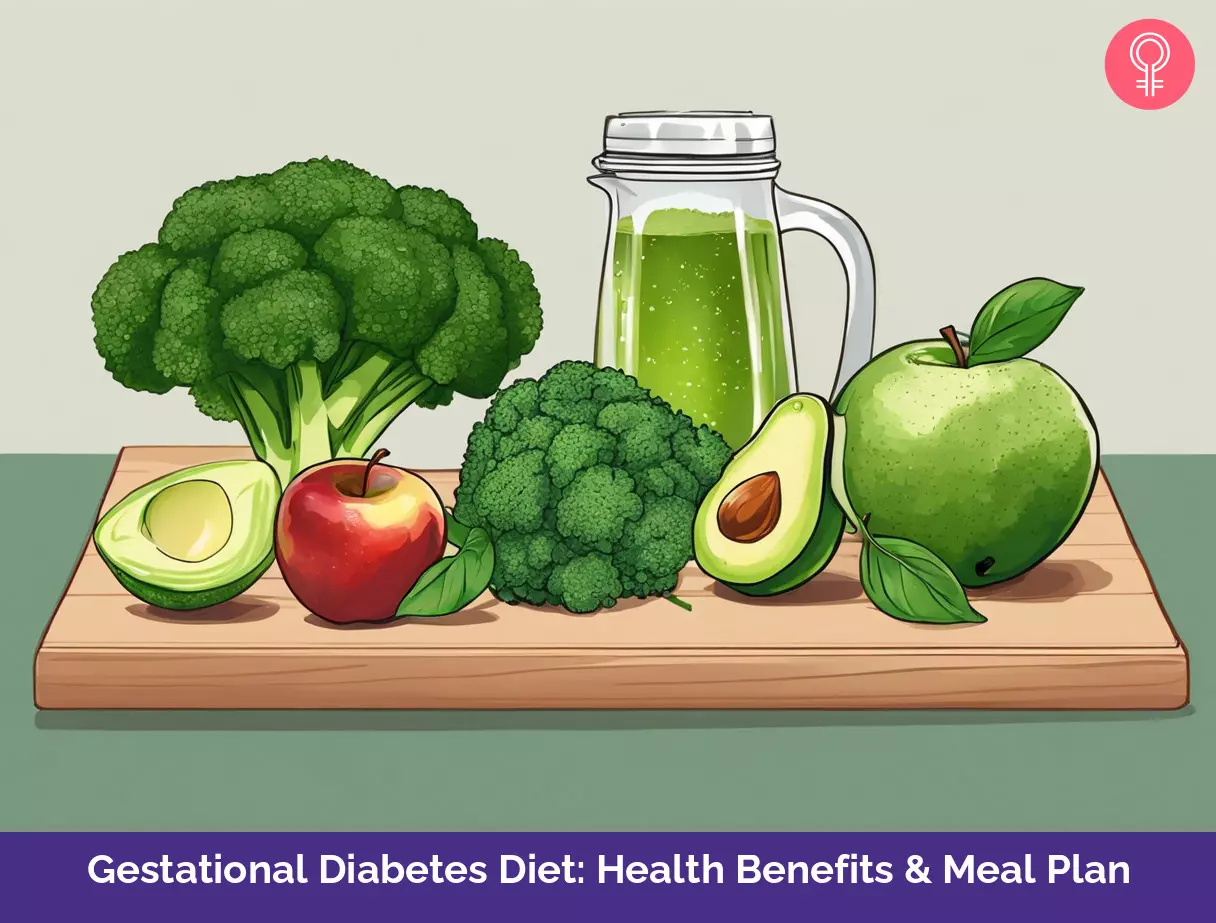What Is Gestational Diabetes?
Gestational diabetes is a type of diabetes that develops during pregnancy due to hormonal changes that affect insulin sensitivityi The body’s ability to respond effectively to insulin, the hormone that helps regulate the body’s blood sugar levels (2). It typically occurs in the second or third trimester. Those who are older, or have a higher body mass index (BMI)i A medical formula that uses a person’s body weight and height to determine their body fat and severity of obesity , a history of gestational diabetes mellitus (GDM), or have first-degree relatives with diabetes could be at a higher risk (3). Such high blood sugar levels can lead to preeclampsiai A pregnancy complication characterized by high blood pressure and organ damage that may occur after the 20th week of pregnancy and cause the baby to have excessive birth weight (4), (5). A glucose intolerance test is conducted between the 24th and 28th weeks of pregnancy to check for gestational diabetes. Gestational diabetes management involves diet, exercise, and medication to control blood sugar levels. The doctor may monitor your blood sugar levels after the baby’s birth to check for type 2 diabetes. Most women with gestational diabetes have healthy pregnancies and return to having normal blood sugar levels after childbirth. A customized diet is key to managing gestational diabetes. Learn more about such a diet in the next section.
What Is The Gestational Diabetes Diet?
The gestational diabetes diet is a type of pregnancy diet specifically designed to help manage blood sugar levels during pregnancy. However, there is more to the pregnancy diet that you must explore and discuss with your doctor before finalizing anything. It promotes the consumption of whole grains, healthy fats, lean proteins, and vegetables to provide energy and balanced nutrition and to reduce blood sugar spikes. It also encourages the intake of high-fiber foods to aid in digestion and stabilize blood sugar levels (6). It limits sugary beverages and encourages the consumption of water or sugar-free beverages to maintain adequate hydration. The diet also promotes the intake of small, more frequent meals to prevent sudden blood sugar spikes. While this diet helps manage gestational diabetes, it also offers other important benefits. Learn more in the next section.
Gestational Diabetes Diet Benefits
1. Regulates Blood Sugar Levels
The intake of high-fiber foods and small, frequent meals may help stabilize blood sugar levels and reduce the risk of preterm delivery and pregnancy hypertensioni High blood pressure that develops after the 20th week of pregnancy and may cause sudden weight gain and dizziness (7).
2. May Reduce The Risk Of Fetal Macrosomia
Gestational diabetes is associated with high insulin levels in the fetus, which may increase the risk of fetal macrosomia (abnormally large baby) (8). Consumption of high-fiber foods can help regulate blood sugar levels and lower the risk of weight gain in the baby (9).
3. May Lower The Risk Of Preeclampsia
Women with gestational diabetes have an increased risk of developing preeclampsia (10). This diet may reduce that risk by stabilizing blood sugar levels.
4. May Aid In Healthy Weight Gain
Sticking to the weight gain recommendations from your doctor during pregnancy, (while a woman with normal weight must have a weight gain around 17–25 kg during pregnancy, a woman who is overweight must have a weight gain around 14–23 kg, and woman who is obese must have weight gain around 11–19 kg) (11). This approach may reduce the risk of fetal macrosomia and stillbirth (12). The gestational diabetes diet promotes the consumption of lean protein, whole grains, and healthy fats. These may also help promote healthy weight gain in the baby and minimize complications.
5. May Improve Fetal Health
Poor maternal nutrition is associated with low birthweight and restricted fetal growth (13). The diet promotes the consumption of lean proteins, healthy fats, and whole grains that ensure maternal nutritional needs. This, in turn, promotes optimal growth, health, and development of the baby.
6. May Lower The Risk of Low Blood Sugar
The gestational diabetes diet promotes the intake of fiber-rich foods. These slow down the absorption of carbohydrates and help stabilize postprandial glucose levelsi Blood sugar levels within 4 hours after having a meal, which serve as an indicator of your metabolic health (14). As we saw, this diet offers a range of health benefits. Starting this diet is fairly simple. In the following section, we discuss the foods you can start consuming.
Foods To Eat With Gestational Diabetes
Non-Starchy Vegetables: Leafy greens like spinach, kale, lettuce, broccoli, cauliflower, bell peppers, cucumbers, and zucchini Starchy Vegetables (in moderation): Sweet potatoes, corn, and peas Fruits: Berries, apples, pears, citrus fruits, cherries, and kiwi Lean Proteins: Chicken, turkey, lean cuts of beef or pork, salmon, trout, tofu, lentils, and chickpeas Dairy And Dairy Alternatives: Low-fat yogurt, skim milk, and unsweetened almond milk Whole Grains (in moderation): Quinoa, brown rice, and whole wheat pasta Healthy Fats: Avocado, nuts, and olive oil Snacks (in moderation): Greek yogurt, hummus, and low-fat cheese Beverages: Water and herbal tea
In addition to consuming these foods, you also need to avoid certain foods to achieve effective results. Learn what they are in the next section.
Foods To Avoid With Gestational Diabetes
Simple Carbohydrates: White bread, white rice, regular pasta, cereals, soda, and fruit juices Fruits: Watermelon, grapes, mangoes, and pineapple Snacks: Sugary snacks and candies Vegetables: Carrots and butternut squash Processed Foods: Fried chicken, sausages, bacon, hot dogs, and processed meats Sugary Dairy Foods: Flavored yogurt, ice cream, and sweetened milk alternatives
Incorporating the right foods into your diet and avoiding the wrong foods is the first step. To make this process further easier for you, we have included a sample meal plan in the next section. Check it out.
Gestational Diabetes Diet Sample Meal Plan
Day 1 Day 2 Day 3 Can I still enjoy sweet treats occasionally on a gestational diabetes diet? While occasional indulgences in sweet treats are allowed, it is better to consult a dietitian to consider the portion sizes and meal timings. You can always opt for sugar-free sweets to satisfy your sweet cravings. Is physical activity important for managing gestational diabetes? Yes, engaging in moderate-intensity exercise five times a week may help manage gestational diabetes and reduce the risk of weight gain (2), (15). Consult your healthcare provider for suitable exercises to ensure they align with your specific health needs. Can I breastfeed with gestational diabetes? Yes, you can breastfeed with gestational diabetes. Breastfeeding may help reduce the risk of breast and ovarian cancers in the premenopausal period (16). It may also reduce the risk of upper respiratory tract infections and diarrhea in infants (17). However, make sure your blood sugar levels are under control before you feed. Research suggests that high maternal glucose may pass into the milk and increase the risk of hypoglycemia in the infant (18). Also, consult your healthcare provider for any dietary adjustments, if needed. Can gestational diabetes affect my baby’s health? Uncontrolled gestational diabetes may increase the risk of macrosomia (larger birth weight) and potential complications during childbirth like difficult labor or preeclampsia. Proper management of your blood sugar levels through diet and professional guidance can help minimize these risks. Will I need to continue this diet after pregnancy? Your healthcare provider will assess your blood sugar levels after pregnancy. If they return to normal, you may no longer have to follow the gestational diabetes diet. It is important to remember that a healthy diet and lifestyle are key to maintaining your overall health. Are there any long-term risks associated with gestational diabetes? Yes, women with a history of gestational diabetes may have a higher risk of developing type 2 diabetes later in life. Regular check-ups and a healthy lifestyle can help reduce this risk. Can gestational diabetes affect the timing or method of labor and delivery? Yes, uncontrolled gestational diabetes may increase the risk of emergency C-section or preterm delivery (3), (19). While the exact mechanism behind this is still not known, consult your healthcare provider to help monitor the well-being of you and your child. Can stress affect blood sugar levels during pregnancy with gestational diabetes? Yes, stress causesinsulin resistancei The body’s inability to respond to the insulin hormone, which often leads to elevated blood sugar levels and decreased insulin secretion, which may lead to high blood sugar levels during pregnancy (20). Engage in relaxation techniques and regular physical activity, and seek professional help to maintain stable blood sugar levels during pregnancy.
Illustration: Gestational Diabetes Diet: Health Benefits & Meal Plan
A tailored dietary approach can help manage gestational diabetes. Check out this video for simple and delicious recipes that ensure you meet your nutritional requirements during pregnancy.










